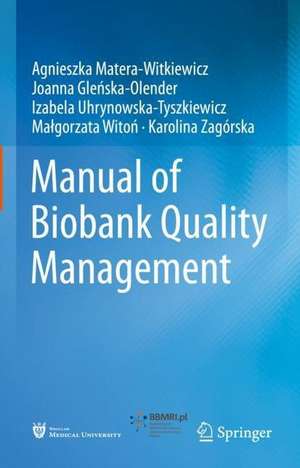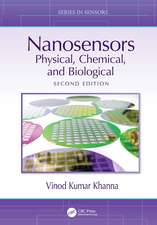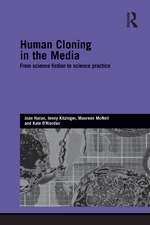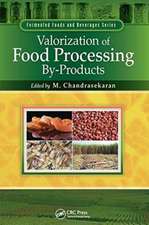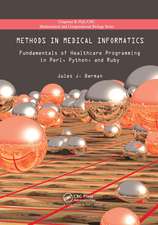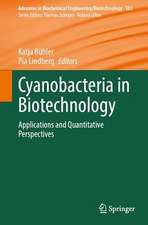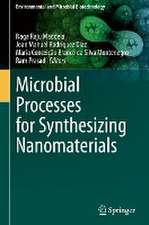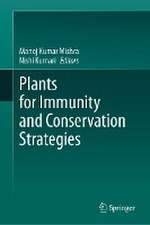Manual of Biobank Quality Management
Autor Agnieszka Matera-Witkiewicz, Joanna Gleńska-Olender, Izabela Uhrynowska-Tyszkiewicz, Małgorzata Witoń, Karolina Zagórska, Katarzyna Ferdyn, Michał Laskowski, Patrycja Sitek, Błażej Marciniak, Jakub Pawlikowski, Dominik Strapagielen Limba Engleză Hardback – 15 feb 2023
This pioneering handbook serves as an essential tool for any biobanking entity to create, implement and continuously improve their Quality Management System (QMS). Written in a concise and highly readable manner all biobanking related QMS aspects, ranging from legal aspects to safety matters, are addressed according to the best knowledge in compliance with the dedicated Biobanks ISO standards. Following a practical approach by making use of FAQ and common practice sections this book guides the readers through this complex field in an easy-to understand way. The guidelines are convergent not only with ISO 20387:2018 Biotechnology - Biobanking - General requirements for biobanking but also with ISO 9001:2015, ISO 19011:2018, ISO 27000:2014, and ISO 27002:2013. Furthermore, they are compatible, among others with the recommendations of the Organization for Economic Cooperation and Development (OECD), IARC, and ISBER Best Practices.
Aimed at both biobank employees and other stakeholders (e.g. public bodies, political bodies, hospitals, pharmaceutical industry, funders) at any level of experience the book serves as valuable source for self-education and teaching. The manual complies to the principles of responsibility, openness, and transparency and can be used by any biobanking unit regardless of the biological material the biobank operates with and independent of their associated biobank network.
On behalf of a group of specialists and experts in the area of biobanking, regarding Quality Management Systems (QMS), Ethical, Legal and Societal Issues (ELSI) and IT solutions, the authors present with this book a significant achievement based on activities within the project, European Research Infrastructure BBMRI-ERIC „Quality Standards for Polish Biobanks” Handbook (QSPB).
| Toate formatele și edițiile | Preț | Express |
|---|---|---|
| Paperback (1) | 408.23 lei 6-8 săpt. | |
| Springer International Publishing – 15 feb 2024 | 408.23 lei 6-8 săpt. | |
| Hardback (1) | 414.82 lei 6-8 săpt. | |
| Springer International Publishing – 15 feb 2023 | 414.82 lei 6-8 săpt. |
Preț: 414.82 lei
Nou
79.42€ • 82.71$ • 65.90£
Carte tipărită la comandă
Livrare economică 13-27 februarie
Specificații
ISBN-10: 3031125584
Pagini: 152
Ilustrații: XVII, 152 p. 1 illus.
Dimensiuni: 155 x 235 mm
Greutate: 0.43 kg
Ediția:1st ed. 2023
Editura: Springer International Publishing
Colecția Springer
Locul publicării:Cham, Switzerland
Cuprins
Dictionary
1. Management of Biobanks
1.1. Organization 1.1.1. Organizational structure of the organization/institution under which the biobank operates
1.1.2. Organizational chart of the biobank
1.2. Biobank's mission and scope of activity 1.3. Biobank’s objectives and their monitoring
1.4. Communication
1.4.1. External communication
1.4.2. Internal communication
2. Quality Management
2.1. General requirements 2.2. Quality policy
2.3. Setting objectives
2.4. Risk and opportunity management
2.4.1. Identification of risk and
2.4.2. Risk and opportunities assessment (evaluation and analysis)
2.4.3. Reaction to risk and opportunities
2.4.4. Monitoring of risk and opportunities
3. Documentation and Records
3.1. General requirements
3.1.1. Traceability of documentation
3.1.2. Readability of documentation
3.1.3. Availability of documentation for biobank employees
3.1.4. Confidentiality 3.1.5. Supervision of changes in documentation
3.1.6. Backup / safety copies of documentation
3.2. Implementing documentation
3.2.1. Responsibility for dealing with documentation
3.2.2. Update and withdrawal of documentation
3.2.3. Training after documentation updates
3.2.4. Documentation distribution 3.3. Storage of QMS documentation
3.3.1. Records
3.4. Verification of documentation
3.4.1. Periodic and incidental verification of documentation
4. Human Resources Management
4.1. Human resources management policy 4.2. Biobank employee identification
4.3. Admission of an employee to the biobank
4.3.1. Scope of initial training
4.3.2. On-the-job training
4.4. Responsibility and permissions of key personnel
4.5. Biobank personnel training (improvement training)
4.6. Verification of biobank employees’ knowledge 4.7. Training documentation
4.8. Termination of employment
5. Ethical and Legal Aspects
5.1. Compliance with ethical and legal requirements
5.2. Ethical advice and approval
5.3. Impartiality 5.3.1. Impartiality safeguarding
5.3.2. Risks to impartiality
5.3.3. Transparency and documentation
5.3.4. Responsible supervision
5.3.5. Communication
5.4. Confidentiality and privacy
5.5. Respect for autonomy 5.5.1. General requirements
5.5.2. Informed consent
5.5.3. Re-contacting with participants
5.5.4. Right to refuse consent and right to withdraw consent
5.5.5. The right to know and not to know the results
5.5.6. Consent from participants who are not capable to give a consent
5.6. Sharing material and data
5.7. Proprietary rights and commercialization
6. Supplies, Materials Management
6.1. Materials receipt rules
6.2. Reception, qualification and acceptance of materials
6.3. Qualification of suppliers
6.4. Handling of materials stored in storage space
6.5. Handling of materials used in daily work
7. Equipment
7.1. Acceptance of the equipment
7.1.1. Device acceptance criteria
7.1.2. Acceptance or rejection of the equipment
7.1.2.1. Installation qualification (IQ)
7.1.2.2. Operational qualification (OQ)
7.1.2.3. Performance qualification (PQ)
7.1.3. Final qualification report (IQ, OQ, PQ) 7.2. Rules for supervision over equipment
7.3. Recordings of equipment operation
7.3.1. Key parameters defined internally
7.3.2. Parameters verified/actions performed directly by the user (user maintenance)
7.3.3. Parameters verified/actions performed by an external company
7.3.4. Recordings from maintenance, cleaning of the equipment
7.4. Work with equipment outside the supervision
7.5. Requalification of critical equipment
8. Traceability
8.1. Traceability system
8.2. Unique identification of biological material
9. Environmental and Staff Hygiene
9.1. Personnel hygiene and safety
9.1.1. Occupational health and safety
9.1.1.1. Occupational risk 9.1.1.2. Periodic examinations
9.1.1.3. Personal protective equipment
9.1.1.4. Handling of clothing and protective equipment
9.1.2. Chemical and hazardous substances
9.1.3. Work with potentially infectious material derived from humans
9.1.3.1. The list of employees exposed to biological agents
9.1.3.2. Occupational exposure
9.1.3.3. Disinfection
9.2. Process environment
9.2.1. Environmental conditions and staff hygiene 9.3. Waste management
10. Biobanking Processes and Quality Control
10.1. The life cycle of biological material and critical processes
10.1.1. Acquisition of the biological material and related data
10.1.2. Transport of biological materials and associated data
10.1.2.1. Transport from and to the biobank (shipping)
10.1.2.2. Transport within the biobank
10.1.3. Reception, qualification and acceptance of biological material and associated data for inventory
10.1.4. The process of handling of biological material and associated data
10.1.4.1. Processing of material and data
10.1.4.2. Storage of material and data
10.1.5. Transport of material and data within the biobank 10.1.6. Process of withdrawing biological material and associated data
10.2. Quality control
11. Deviations, Nonconforming Product/Data or Service
11.1. Deviations/Nonconformities
11.2. Corrective and correction actions
11.3. Complaints
11.4. Nonconforming output/service
11.4.1. Identification of nonconforming products/services and accompanying documentation
11.4.2. Rejection of nonconforming product/service
12. Audits
12.1. Internal audit 12.2. Auditor’s competences and qualifications
13. Improvement
13.1. Tools for improving the effectiveness of biobank
13.2. Management review
13.2.1. Conducting a management review
14. Biobank Cooperation in the Scientific, Research and Development Area
14.1 General requirements
14.2 Sharing of biological material and data for research 14.3. Cooperation agreements
14.4. Communication during scientific cooperation
14.4.1. Informing about irregularities in the course of research
15. Safety & Security
15.1. Security procedures
15.2. Biological material safety
15.3. Information security
15.4. Basic methods of securing it infrastructure and data processing
15.4.1. Awareness of the functioning the biobank in the organization 15.4.2. General principles for the secure exchange of information
15.4.3. Security of processed data
15.4.4. Basic methods of securing access to the premises 15.4.5. Operating systems and software
15.4.6. Anti-virus software
15.4.7. User and password management
15.4.8. Lan network
15.4.9. Emergency power supply
15.4.10. Basic features of the biobank it system
15.4.11. Backups 15.4.12. External services including cloud services
15.4.13. Personnel
Notă biografică
Agnieszka Matera-Witkiewicz: PhD Pharmacy, Biotechnologist, Clinical Trials Management, R&D Project Manager; Wroclaw Medical University Biobank concept creator-first Integrated Biobank in Poland with ISO9001 Quality Certificate; BBMRI.pl Quality Manager; BBMRI-ERIC Quality Expert/Auditor; ISO9001 Lead Auditor, Polish Committee for Standardization TC 287 Biotechnology expert; ISO Expert TC 276 Biotechnology WG2 Biobanks and Bioresources; ESBB member; Co-author and concept creator of “Quality Standards for Polish Biobanks Handbook”; she prepared first biobank in Poland to accreditation according to ISO 20387-2021-01.
Joanna Gleńska-Olender: PhD in biological sciences; QMS Expert, Lead Auditor and Trainer in BBMRI.pl; Polish Committee for Standardization TC 287 Biotechnology expert; ISO Expert TC 276 Biotechnology WG2 Biobanks and Bioresources; Co-author of “Quality Standards for Polish Biobanks Handbook”; biobanking experience from 2014.
Izabela Uhrynowska-Tyszkiewicz: Physician, Doctor of Medicine, academic teacher; area of interest in terms of quality and safety of human somatic tissues and cells intended for human application, application of computer systems in the practice of tissue and cell banking, coding of tissues and cells, legal aspects of tissue and cell banking. Co-author of “Quality Standards for Polish Biobanks Handbook”.
Małgorzata Witoń: Biotechnologist and scientist with special interest in Quality Management and biobanking as well as digital pathology; started professional career as a clinical embryologist and academic teacher; several years of experience in the application and implementation of R&D projects and in working on the QMS implementation and maintenance; co-author of “Quality Standards for Polish Biobanks Handbook”.
Karolina Zagórska: A graduate of Medical Analytics, Certified Laboratory Diagnostician, post-graduate studies Microbiology, Hygiene and Quality in Industry. Technical expert in the BBMRI.QM Services. A member at the Polish Committee for Standardization (PKN) at KT 287 for Biotechnology and Expert at ISO TC 276 Biotechnology, WG 2 Biobanking and Bioresources; co-author of “Quality Standards for Polish Biobanks Handbook”.
Katarzyna Ferdyn: From 2004 is working in the biotechnological area; experience in biobanking processes mapping, processes implementation including tissue and cell banking; Polish Committee for Standardization TC 287 Biotechnology expert; co-author of “Quality Standards for Polish Biobanks Handbook”; QMS Expert, Lead Auditor and Trainer in BBMRI.pl in 2017-2019.
Michał Laskowski: M.Sc. of Medical Diagnostic, Medical University of Lublin, Poland. In biobanking area from 2014. From 2017 biobanking specialist at Wroclaw Medical University Biobank; responsible for development of technological and procedural solutions regarding the collection of biological material and data. Representative in Polish Committee for Standardization and ISO Working Groups; co-author of “Quality Standards for Polish Biobanks Handbook”; he prepared first biobank in Poland to accreditation according to ISO 20387-2021-01.
Patrycja Sitek: MSC of Biotechnology, MSC of Chemistry, 14 years of experience in the field of GMP and Tissue Banking industry. From 2019 IRCA ISO 9001 Lead auditor with experience in biobanking. BBMRI pl and BBMRI ERIC auditor, trainer and consultant; co-author of “Quality Standards for Polish Biobanks Handbook”.
Błażej Marciniak: Information technology expert, gained experience in the startup environment, since 2009 associated with the University of Łódź, and since 2014 with the Biobank Laboratory. In Biobank, he manages IT resources, coordinates IT projects in the field of digitization of science resources and data sharing infrastructure. Co-organizer of bioinformatics hackathons; co-author of “Quality Standards for Polish Biobanks Handbook”.
Jakub Pawlikowski: M.D., Ph.D., J.D., M.A.: graduated in medicine, law and philosophy. Professor at Department of Humanities and Social Medicine at Medical University of Lublin (Poland). His research interests focuses on research ethics, medical law and public health. He is a member of international ELSI expert groups in BBMRI.ERIC and a coordinator of ELSI area in BBMRI.pl; co-author of “Quality Standards for Polish Biobanks Handbook”.
Dominik Strapagiel: Biobank Lab Head at the University of Lodz. He leads development of the integrated database which consists of genomic, health and phenotypic data collected in POPULOUS cohort study of the Biobank - Łódź project.; He is ISO 9001 and ISO 27001 lead auditor.
Textul de pe ultima copertă
This pioneering handbook serves as an essential tool for any biobanking entity to create, implement and continuously improve their Quality Management System (QMS). Written in a concise and highly readable manner all biobanking related QMS aspects, ranging from legal aspects to safety matters, are addressed according to the best knowledge in compliance with the dedicated Biobanks ISO standards. Following a practical approach by making use of FAQ and common practice sections this book guides the readers through this complex field in an easy-to understand way. The guidelines are convergent not only with ISO 20387:2018 Biotechnology - Biobanking - General requirements for biobanking but also with ISO 9001:2015, ISO 19011:2018, ISO 27000:2014, and ISO 27002:2013. Furthermore, they are compatible, among others with the recommendations of the Organization for Economic Cooperation and Development (OECD), IARC, and ISBER Best Practices.
Aimed at both biobank employees and other stakeholders (e.g. public bodies, political bodies, hospitals, pharmaceutical industry, funders) at any level of experience the book serves as valuable source for self-education and teaching. The manual complies to the principles of responsibility, openness, and transparency and can be used by any biobanking unit regardless of the biological material the biobank operates with and independent of their associated biobank network.
On behalf of a group of specialists and experts in the area of biobanking, regarding Quality Management Systems (QMS), Ethical, Legal and Societal Issues (ELSI) and IT solutions, the authors present with this book a significant achievement based on activities within the project, European Research Infrastructure BBMRI-ERIC „Quality Standards for Polish Biobanks” Handbook (QSPB).
Caracteristici
Follows a modern and hands-on approach
Complies to the principles of responsibility, openness, and transparency
